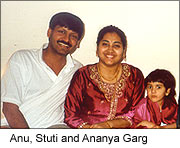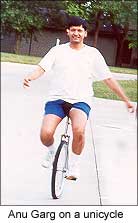The Rediff US Special/Aseem Chhabra

Words play a major role in Anu Garg's life.
Growing up in Nainital, Garg remembers enjoying "word books" over "picture books". Now as an adult, he says, he dreams in words.
"Words come from all over the place," says the soft-spoken Garg, who seven years ago started a free Internet-based service www.wordsmith.org that today sends out a word a day to approximately 400,000 e-mails addresses around the world.
"Sometimes I am reading something and I find a word that intrigues me. Words have a life of their own. They evolve over time. They grow. They die...
"To me all people are fascinating, if you take time to learn about them," adds Garg, who's a computer programmer at AT&T's facility in Columbus, Ohio during the day.
"Some people may appear very plain on the surface, but actually may be very fascinating. Everyone has some aspect of their life that you will find really unusual. And it is same with words."
 Garg's idea was simple. In 1994, as a graduate student at Case Western University in Cleveland, Ohio, he decided to create on an experimental basis a "word server" that would give his colleagues a chance to connect with him through e-mails and find the meaning or correct spelling of a word.
Garg's idea was simple. In 1994, as a graduate student at Case Western University in Cleveland, Ohio, he decided to create on an experimental basis a "word server" that would give his colleagues a chance to connect with him through e-mails and find the meaning or correct spelling of a word.
Another concept he proposed was that as students would log on to their computers in the morning they would be greeted by an e-mail introducing them to an English word along with its meaning.
"The idea was that everyday you learn a new word," Garg, 34, says. Some students signed up for the "A.Word.A.Day" or AWAD service.
On March 14, 1994, a group of students was introduced to the first word -- zephyr -- part of a theme that involved Greek, Latin, French and German words (including prophylactic, sidereal, demesne, dressage and arboretum), now adopted by the English language.
The first e-mail read:
zeph.yr \'zef-*r\ n
1: a breeze from the west; also: a gentle breeze,
2: any of various lightweight fabrics and articles of clothing
As an added bonus the recipients were treated to a quote from Mahatma Gandhi:
I object to violence because when it appears to do good, the good is only temporary; the evil it does is permanent.
(The quotes have prevailed until now. Garg later started adding a sentence which would include the word of the day.)
The March 15 word was another European addition to the English language -- zwieback.
The e-mail read:
zwie.back \'swe_--.bak, 'swi_--\ n: a sweetened bread that is baked and then sliced and toasted until dry and crisp.
The quote of the day, from the American poet Hart Crane (1899-1932) was a lesson for word lovers:
One must be drenched in words, literally soaked in them, to have the right ones form themselves into the proper patterns at the right moment.
Foreign words in English have remained one of Garg's favourite themes, including words from Indian languages.
In fact, just last week Garg selected the word pariah.
pariah (puh-RI-uh) noun: an outcast
[From Tamil paraiyar, plural of paraiyan, drummer, people considered lower in rank in the former caste system of India.]
And the sentence of the day read:
Sending spam or unsolicited e-mail is the fastest way to become a pariah on the Internet.
The response to Garg's e-mails was tremendous. His fellow students forwarded the e-mails to friends at other universities and soon, like a virus, the concept spread across the United States.
"It spread by word of mouth and pretty soon there were requests coming from outside America," he says. "That's when I realized this was something very potent."
Today AWAD e-mails reach 195 countries, all the continents and obviously all the 50 US states.
"I had no idea that one day this would grow into such a large community. If you read the e-mails I get, you would get the sense that these people are word fanatics."
One New Yorker recently wrote:
Thank you for your daily output of creativity, energy & thoughtfulness. If I were a doctor, I should prescribe your site to all my patients as a preventative. Were I a shaman, I should use it to continue lifting the spirits. But nay, I am but a petite woman in NYC, alone in my living room, laughing my head off reading the AWAD monthly feedback. Ha, ha, ha, my hat's off to you! Thank you for increasing my intelligence bit by bit.
Another e-mail with the subject line "Missing My Word Today" read:
I've only been subscribing for about a few weeks and the receipt of my word has, thus far, been like clockwork, until today. I have yet to receive my word today and am beginning to suffer withdrawal symptoms. I'm about to start thumbing through my dictionary, but it's just not the same. Please help. I'm desperate! My co-workers depend on me to provide their daily linguistic fix -- don't let me down.
 To ensure that his subscribers do not frequently suffer from withdrawal symptoms, Garg plans his words two to three weeks in advance. It also helps his travel schedule associated with his day-job, which he is still not ready to quit. ("Not in this climate," he says.)
To ensure that his subscribers do not frequently suffer from withdrawal symptoms, Garg plans his words two to three weeks in advance. It also helps his travel schedule associated with his day-job, which he is still not ready to quit. ("Not in this climate," he says.)
On an average Garg spends four to five hours a day -- mostly early mornings or late nights -- on AWAD. His wife Stuti pitches in, as do two dedicated volunteers, both of whom Garg has never met personally.
One volunteer, Todd Derr in Pennsylvania, wrote a high-speed mailer for Garg that starts to send out the 400,000 e-mails at midnight. The four-hour-long process is maintained by a commercial server, which is based in California.
There is an approximate cost of $500 a month to maintain the server, plus there are incidental expenses.
"But I find it such a rewarding experience, because money is not the only reward you can get," he says. "I recently got an email from a disabled priest who wrote that 'I am here in this room all by myself. Your AWAD e-mail is my only window to the world'."
Garg also takes immense satisfaction in the fact that he has coined a word in the English language -- linguaphile.
"I coined linguaphile because I felt there was no word that describes a person who loves words and languages," he says. "A word comes to life to fill a need and soon the word linguaphile was catching up. Since then, I have found its citations in newspapers, magazines and other publications from Israel, Malaysia, the UK, US, and many other places."
Last year the fourth edition of the American Heritage Dictionary listed linguaphile as a word.
"Usage is the single most important factor to determine if a word gains membership of that exclusive club -- the dictionary. It has to appear extensively, in many different sources such as newspapers, magazines, books, TV, radio, Internet etc, over several years to show that it is gaining currency. Also, it doesn't hurt if the word is catchy and captures the public imagination."
Garg's passion for words is clearly infectious. Just ask his four-year-old daughter Ananya where her nose and lips are. Like any clever child, she will point in the right direction. Then ask her what is the name for the groove between her nose and her lips.
"Philtrum," she'll tell you.
That was the November 2, 2000, word of the day:
philtrum (FIL-truhm) noun: the vertical groove above the upper lip.
[From Greek philtron, philter, charm, dimple in the upper lip]
"That face makes demands beyond the imagination. Each plane of it -- even the philtrum, the rectangular cleft above her upper lip -- perfectly formed and entirely symmetrical, each a separate, swelling voice in a choir of pure praise."
-- Esquire, Nov 1, 1997, referring to model Christy Turlington.
Back to top
Tell us what you think of this feature